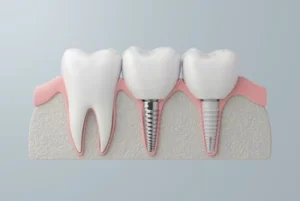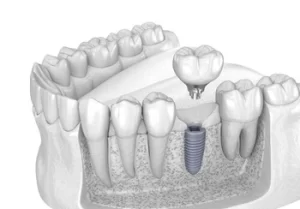Dental implants are one of the most effective and natural-looking ways to replace missing teeth. They offer durability, improved function, and a seamless match for natural teeth. However, because dental implant surgery is an invasive procedure, some level of discomfort is normal during the healing process. Knowing how to manage dental implant pain and what to expect during recovery can make a major difference in your healing journey.
This guide explores what causes dental implant pain, how long it usually lasts, and the most effective strategies for managing discomfort, reducing swelling, and supporting optimal healing.
Understanding Why Dental Implant Pain Happens
Feeling some discomfort after dental implant surgery is entirely normal and part of your body’s natural healing process. Knowing why dental implant pain occurs helps you better manage it, recognise what’s typical, and identify when it might signal a potential issue that needs professional attention.
What Happens During the Dental Implant Procedure
 Dental implants involve placing a titanium post into the jawbone to act as an artificial tooth root. This is followed by a healing period before attaching the crown that resembles a natural tooth. Because this is a surgical procedure, it’s common to experience mild discomfort, swelling, and tenderness around the implant site, especially in the first few days after surgery.
Dental implants involve placing a titanium post into the jawbone to act as an artificial tooth root. This is followed by a healing period before attaching the crown that resembles a natural tooth. Because this is a surgical procedure, it’s common to experience mild discomfort, swelling, and tenderness around the implant site, especially in the first few days after surgery.
During a tooth implant procedure, the dentist carefully opens the gum tissue, creates space in the jawbone, and securely places the implant. The body then begins a process known as osseointegration, where the bone gradually bonds with the implant. Most people recover without issues, but being aware of what’s ahead can help you feel prepared and manage your healing with confidence..
Normal Discomfort vs. Concerning Pain
Some discomfort after dental implant surgery is expected, but intense or lasting pain may indicate a complication. Knowing the difference helps you take the right action.
Typical Recovery Sensations
Most patients report mild discomfort, slight bruising, and mild swelling in the first 48 to 72 hours after oral surgery. This is part of the body’s natural response to healing. The pain usually peaks within the first two to three days and then gradually improves.
Other normal sensations may include:
- Tenderness around the implant site
- Minor bleeding for the first 24 hours
- Mild jaw stiffness
- Sensitivity when chewing
These symptoms typically subside within a week as the healing process continues.
When Pain May Signal a Problem
While mild discomfort is expected, severe pain or persistent symptoms can indicate a complication such as infection, nerve damage, or implant failure. Contact your dentist immediately if you experience any of the following:
- Intense or worsening pain beyond one week
- Excessive bleeding or pus from the surgical area
- Prolonged swelling that doesn’t improve
- Numbness or tingling indicating possible nerve involvement
- The implant feels loose or shifts in place
Prompt action can lower the risk of complications and support proper dental implant healing.
Proven Ways to Relieve Pain from Dental Implants
Managing discomfort after implant surgery is easier when you know what works. With the right care and strategies, you can relieve pain, support healing, and make your recovery more comfortable.
1. Follow Your Dentist’s Post-Operative Instructions
One of the most effective ways to ensure a smooth recovery is to closely follow the postoperative instructions provided by your dental team. These guidelines are tailored to your specific case and designed to minimise discomfort, reduce the risk of infection, and support optimal healing.
- Typical recommendations include: Refrain from rinsing your mouth forcefully during the first 24 hours
- Keeping pressure off the implant site
- Not touching or disturbing the surgical area with your tongue or fingers
- Taking prescribed medications on schedule
Adhering to these instructions can prevent unnecessary complications and promote a comfortable experience.
2. Apply Ice Packs to Ease Swelling and Discomfort
Swelling is a natural part of the healing process after dental implant surgery. Applying ice packs to the outside of your cheek for 15 to 20 minutes at a time during the first 24 to 48 hours can remarkably reduce swelling and numb the area, providing effective pain relief.
Cover the ice pack with a soft cloth before placing it on your face to protect your skin. Elevating your head while resting can also help reduce swelling and improve comfort.
3. Take Pain Medications as Prescribed
Based on how much discomfort you’re experiencing, your dentist may suggest over-the-counter pain relief or prescribe stronger medication. These medications help manage dental implant pain by reducing inflammation and blocking pain signals.
Take the medication exactly as directed and avoid exceeding the recommended dose. If pain persists despite medication, contact your dental team for further evaluation.
4. Stick to a Soft Food Diet During Early Recovery
Chewing hard or crunchy foods can irritate the implant site and delay healing. During the initial recovery period, focus on a soft food diet that’s gentle on your gums and jawbone. Examples include soups, yoghurt, mashed vegetables, scrambled eggs, and smoothies.
As healing progresses and discomfort decreases, you can gradually reintroduce firmer foods. Avoid putting pressure on the implant site until your dentist confirms it’s safe to do so.
5. Practise Gentle Oral Hygiene Around the Implant Site
Maintaining good oral hygiene is necessary for preventing infection and ensuring successful healing. However, immediately after surgery, you’ll need to be careful about how you clean around the implant.
Use a toothbrush with soft bristles and brush gently, avoiding direct contact with the surgical site in the first few days. Rinse your mouth using a warm saltwater solution after meals to help control bacteria gently without causing irritation. As the gum tissue heals, you can slowly return to your normal oral hygiene routine.
6. Rest and Prioritise Adequate Sleep
Healing takes energy, and one of the most effective ways to support your recovery process is by allowing your body enough rest. Aim for adequate sleep and avoid strenuous physical activities for at least 48 hours after implant surgery. Overexertion can increase blood flow to the surgical site and contribute to swelling or bleeding, potentially delaying healing.
7. Avoid Activities That Could Delay Healing
Certain behaviours can slow down your recovery and increase discomfort. During the healing period, try to avoid:
- Smoking, which reduces blood flow and delays healing
- Using a straw can dislodge the blood clot at the surgical site, increasing the risk of complications and slowing down healing.
- Consuming alcohol can interfere with medications and slow recovery.
- Touching or pressing on the implant site with your tongue or fingers
Being mindful of these actions can significantly affect how quickly and comfortably you recover.
Complications That May Cause Persistent Pain
While most patients experience minimal discomfort after dental implant treatment, persistent or severe pain may indicate an underlying problem. Understanding these potential complications can help you take action early.
 Infection at the Implant Site
Infection at the Implant Site
Infection is one of the most common causes of dental implant pain. It can develop if bacteria enter the surgical site during or after the procedure. Signs include redness, swelling, pus, and worsening pain. Prompt treatment with antibiotics and professional care can prevent the infection from spreading.
Implant Failure
Although rare, dental implant failure can occur if the implant doesn’t integrate with the jawbone or if excessive pressure is applied too soon. This can lead to pain, implant mobility, or even implant loss. Timely diagnosis and prompt treatment are essential for effectively managing the issue.
Nerve Damage
In very rare cases, nerve damage can occur during implant placement, leading to numbness, tingling, or shooting pain around the implant site or nearby areas. Your dentist must evaluate you immediately to prevent long-term issues.
Excessive Bleeding
Some bleeding is expected in the first 24 hours after oral surgery, but excessive or prolonged bleeding could indicate a problem. Applying gentle pressure with sterile gauze and contacting your dentist promptly can help manage this situation.
Long-Term Pain Management and Dental Implant Aftercare Tips
Effective dental implant pain management doesn’t end once the initial healing phase is over. Even after the discomfort subsides, ongoing care is essential to keep your implant healthy and comfortable. By following proper aftercare routines and monitoring any changes around the implant site, you can ensure long-term comfort, maintain excellent oral health, and protect your investment for many years to come.
Monitor Your Healing Process
The dental implant recovery timeline varies for each patient, but most people feel significantly better within one to two weeks. Complete healing and integration with the jawbone may take several months, during which your dental team will monitor progress to ensure the implant is stable and healing correctly.
Maintain Excellent Oral Hygiene
Long-term success depends heavily on consistent oral hygiene practices. Brush and floss regularly, attend routine dental check-ups, and follow any detailed instructions your dentist gives you for proper healing and recovery. Good dental health reduces the risk of infection and helps your implant last for many years.
Schedule Regular Follow-Up Appointments
Routine follow-up visits allow your dentist to assess healing, check for signs of complications, and make adjustments if necessary. Early detection of potential issues ensures timely treatment and protects your investment in dental implant treatment.
Final Thoughts: A Comfortable Recovery Is Within Reach
 Dental implants offer a dependable and durable way to replace missing teeth, but some discomfort is a natural part of the healing journey. By following postoperative instructions, practising gentle oral hygiene, using ice packs, sticking to soft foods, and taking pain medications as directed, you can minimise discomfort and support a smooth recovery.
Dental implants offer a dependable and durable way to replace missing teeth, but some discomfort is a natural part of the healing journey. By following postoperative instructions, practising gentle oral hygiene, using ice packs, sticking to soft foods, and taking pain medications as directed, you can minimise discomfort and support a smooth recovery.
If you ever experience severe pain, excessive bleeding, or signs of infection, contact Beyond Infinity Dental at (02) 8806 3799 to book an appointment. With proper care, most patients heal properly and enjoy the long-lasting benefits of dental implants for many years, restoring both their smile and confidence.
Note: Any surgical or invasive procedure carries risks. Before proceeding, you should seek a second opinion from an appropriately qualified health practitioner.
References
Healthline. (n.d.). Early and late dental implant problems. Retrieved from https://www.healthline.com/health/dental-implant-problems
MedlinePlus. (n.d.). Article on oral health / dentistry. Retrieved from https://medlineplus.gov/ency/article/002123.htm
Cleveland Clinic. (n.d.). Oral hygiene: best practices & instructions for good routine. Retrieved from https://my.clevelandclinic.org/health/treatments/16914-oral-hygiene
Mayo Clinic Staff. (n.d.). Dental implant surgery: overview and risks. Retrieved from https://www.mayoclinic.org/tests-procedures/dental-implant-surgery/about/pac-20384622









